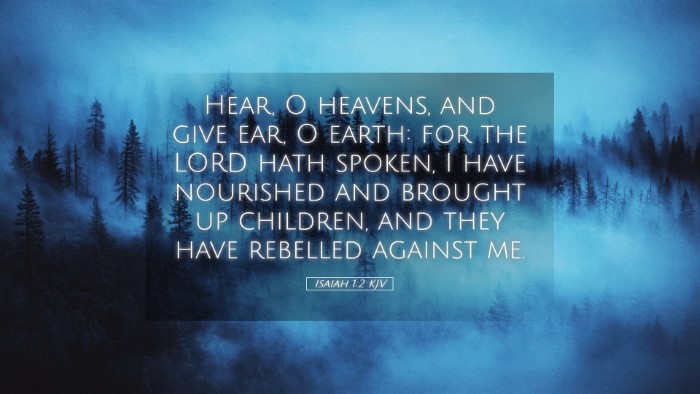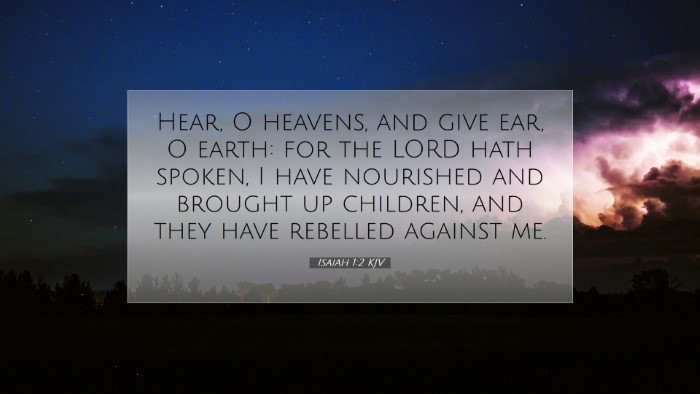Isaiah 1:2 states:
"Hear, O heavens, and give ear, O earth: for the Lord hath spoken, I have nourished and brought up children, and they have rebelled against me."
Introduction
This verse from the book of Isaiah serves as a poignant introduction to the profound themes of rebellion, responsibility, and divine lamentation. The prophet Isaiah sets the stage for a prophetic message that addresses the nation of Israel's disobedience and the consequences that follow. This commentary seeks to synthesize insights from historical biblical commentaries to unpack the significance of this first verse from Isaiah.
Divine Appeal to Creation
In this verse, Isaiah invokes both the heavens and the earth to witness the declaration of God. This act of calling creation to attention can be understood in several layers:
- Cosmic Witness: Isaiah’s invocation of the heavens and the earth is a classic literary device found in prophetic literature, emphasizing the seriousness of God’s message. As Matthew Henry notes, both heaven and earth serve as witnesses to God’s covenant and human defiance.
- Universal Accountability: Albert Barnes remarks that this appeal to these celestial entities underscores the universal accountability of all creation to God. The heavens and earth symbolize the boundaries of human understanding and the vast scope of God’s authority.
- Establishing Authority: Adam Clarke emphasizes that by calling upon the heavens and earth, God validates His authority and establishes the gravity of the discourse that follows.
Parental Metaphor
In the second part of the verse, God articulates a parental relationship: "I have nourished and brought up children." This metaphor is rich with meaning:
- Care and Responsibility: Matthew Henry explains that God’s role as a parent illustrates His nurturing, protective nature towards His people. It signifies the care that God has shown towards Israel, not only in delivering them but also in providing for their needs.
- Rebellion and Betrayal: The phrase "they have rebelled against me" points to a profound sense of betrayal. Adam Clarke remarks that this rebellion reflects a conscious choice to reject the guidance and enrichment offered by God, akin to children rebelling against their parents.
- Expectation of Loyalty: The image of God as a parent carries expectations of loyalty and obedience. Albert Barnes posits that this metaphor emphasizes the sorrow and disappointment of a parent when their children turn away from the values they were taught.
Theological Implications
The implications of Isaiah 1:2 extend into various theological realms:
- Sin and Accountability: The acknowledgment of rebellion highlights the condition of sin within humanity. Matthew Henry draws attention to the necessity for humans to recognize their sinful nature and the accountability that comes with it.
- The Nature of God: This verse reveals attributes of God: His nurturing love and the pain of rejection. Adam Clarke points out that God's sorrow over Israel’s rebellion is indicative of His deep love and desire for relationship with His creation.
- Prophetic Warnings: Isaiah stands as a prophet, calling the nation to repentance. This verse serves as a precursor to a series of warnings and calls for restoration that characterize Isaiah’s message, as noted by Albert Barnes.
Historical Context
Understanding the historical context of Isaiah's audience is crucial for interpreting this verse. The nation of Israel had experienced significant political and social upheaval; understanding their state aids in grasping the urgency of this call:
- Spiritual Decline: As the nation strayed from its covenant obligations, their spiritual decline became evident. Matthew Henry emphasizes that Isaiah’s call serves to indict them for their abandonment of God’s ways.
- Idolatry and Corruption: Albert Barnes points to the rampant idolatry and social injustices present during Isaiah's time, indicating that these actions were a direct rebellion against the love and guidance of their divine parent.
Application for Today
The relevance of Isaiah 1:2 transcends its historical context and speaks profoundly to contemporary believers:
- Call to Faithfulness: Modern readers are reminded of the importance of faithfulness to God's teachings and the dangers of spiritual rebellion. As noted by Adam Clarke, the consequences of turning away from divine guidance are severe.
- Understanding God’s Heart: Recognizing the emotional depth of God's lament encourages believers to cultivate a deeper relationship with Him, understanding the weight of their actions as a response to His love.
- Responsibility of Witness: Just as the heavens and earth are called to witness, today's believers are called to be witnesses of the divine truth in their communities, embodying the teachings of Christ and advocating for justice and righteousness.
Conclusion
Isaiah 1:2 serves as a foundational verse that encapsulates significant themes of rebellion, divine love, and the urgent call to accountability. By drawing from traditional commentaries and historical context, this verse offers a profound insight into the nature of God and humanity's response. For pastors, students, theologians, and scholars, this passage inspires reflection on God's faithful care and the necessity of returning to a path of loyalty and obedience.


